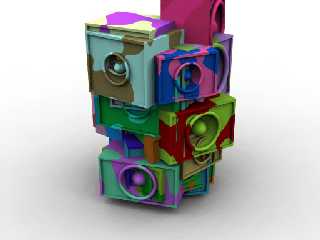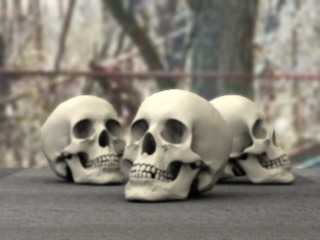 |
 |
|
 |
|
 |
|  |
|  |
|
 |
|
 |
|  |
|  |
|
 |
If I had seen something like this several years ago my jaw would have
dropped. Too bad it's not years ago. :-)
I haven't seen this "Arnold" thing people keep mentioning, should I go look
for it?
Bob
Post a reply to this message
|
 |
|  |
|  |
|
 |
|
 |
|  |
|  |
|
 |
What is arnold?????? Nice model though...
gemelli david wrote:
> after robots, building !
> yes, not very original but I wanted to see if once again, it is possible
> to make a picture with "the same" quality.
> I think it is !! but it is long.
>
> very poor model (I'm not a 3d artist), radiosity, no light, 3h53m on a
> K6-2 400MHz with only 32Mo of RAM.
>
> ------------------------------------------------------------------------
> [Image]
Post a reply to this message
|
 |
|  |
|  |
|
 |
|
 |
|  |
|  |
|
 |
Psychomek wrote:
>
> What is arnold?????? Nice model though...
A radiosity/raytracing engine (monte-carlo kind) intended as
an extension to modellers such as 3DSmax, and, acoording to authors,
makes radiosity quick enough to be used in production (but they don't
give render times, so...).
http://www.3dluvr.com/pepeland/
I can't be too much wrong predicting this is gonna be, once it's
released, the most sought-after warez for max users...
(the current winner in that category being Mental Ray; hey, they
are just discovering soft shadows, monte-carlo radiosity, and
caustics, they are highly excited !!)
Fabien.
Post a reply to this message
|
 |
|  |
|  |
|
 |
|
 |
|  |
|  |
|
 |
"Rick [Kitty5]" wrote:
> after the experiments i did, i also believe that povray can achive 'arnold',
> however its a long painfull process to get it just right!!
>
Actually, the parameters recently provided by MikeH, XPlo and TonyB seem to work
in a good number of situations, and quite fast too. Here are two experiments
with no "real" light sources and a sky sphere. The orientation of the light is
given by a gradient of the sky sphere pigment, such as :
sky_sphere{pigment{gradient x poly_wave 0.5 color_map{[0 White*1.3][1
SkyColor*0.5]} translate -x*0.5 scale 2}}
I do the tests with a low count (30) and render with something like 300. Both
images took approximately 15 min on a PIII 733.
G.
Post a reply to this message
Attachments:
Download 'testrad9.jpg' (35 KB)
Download 'testskull.jpg' (21 KB)
Preview of image 'testrad9.jpg'

Preview of image 'testskull.jpg'

|
 |
|  |
|  |
|
 |
|
 |
|  |
|  |
|
 |
The image of the skulls is really cool, and the way it blends with the photographic
background shows that the calculations are at least somewhat accurate.
-Mike
Post a reply to this message
|
 |
|  |
|  |
|
 |
|
 |
|  |
|  |
|
 |
MikeH wrote:
> The image of the skulls is really cool, and the way it blends with the photographic
> background shows that the calculations are at least somewhat accurate.
In fact, I tried to micmic the first of the skull renderings in the lightwave
gallery.
http://www.newtek.com/products/lightwave/gallery/zoompages/skulls.html
Megapov does a fairly good job I'd say. This is more promising than I ever thought it
would be. One nice thing would be the possibility of having highlights without real
lights, something like light_source{<blah,blah,blah> color Blah highlights_only}.
G.
Post a reply to this message
|
 |
|  |
|  |
|
 |
|
 |
|  |
|  |
|
 |
Where can I find these parameters ? It seems I didn't saw this...
I'm generally using for final radiosity rendering:
count 200
nearest_count 6
recursion_limit 2
error_bound 0.4
is that too low ? too high ?
David
Post a reply to this message
|
 |
|  |
|  |
|
 |
|
 |
|  |
|  |
|
 |
Fnaa! Fnaa! <thud> Ooooh.... my head... That looks very cool Gilles. Please
post the source code. :)
Post a reply to this message
|
 |
|  |
|  |
|
 |
|
 |
|  |
|  |
|
 |
> One nice thing would be the possibility of having highlights without real
> lights, something like light_source{<blah,blah,blah> color Blah
highlights_only}.
That can be done with light_groups. I used them to get highlights in my
image. Have you done any experiments involving reflection in the finish?
Post a reply to this message
|
 |
|  |
|  |
|
 |
|
 |
|  |
|  |
|
 |
"Tony[B]" wrote:
>
> > One nice thing would be the possibility of having highlights without real
> > lights, something like light_source{<blah,blah,blah> color Blah
> highlights_only}.
>
> That can be done with light_groups. I used them to get highlights in my
> image. Have you done any experiments involving reflection in the finish?
Can you post a sample ?
I always thought you can only control how whole objects are affected by the
lights, not the singls aspects of the finish, but it would be nice, if i'm
wrong. :-)
Christoph
--
Christoph Hormann <chr### [at] gmx de>
Homepage: http://www.schunter.etc.tu-bs.de/~chris/ de>
Homepage: http://www.schunter.etc.tu-bs.de/~chris/
Post a reply to this message
|
 |
|  |
|  |
|
 |
|
 |
|  |




![]()